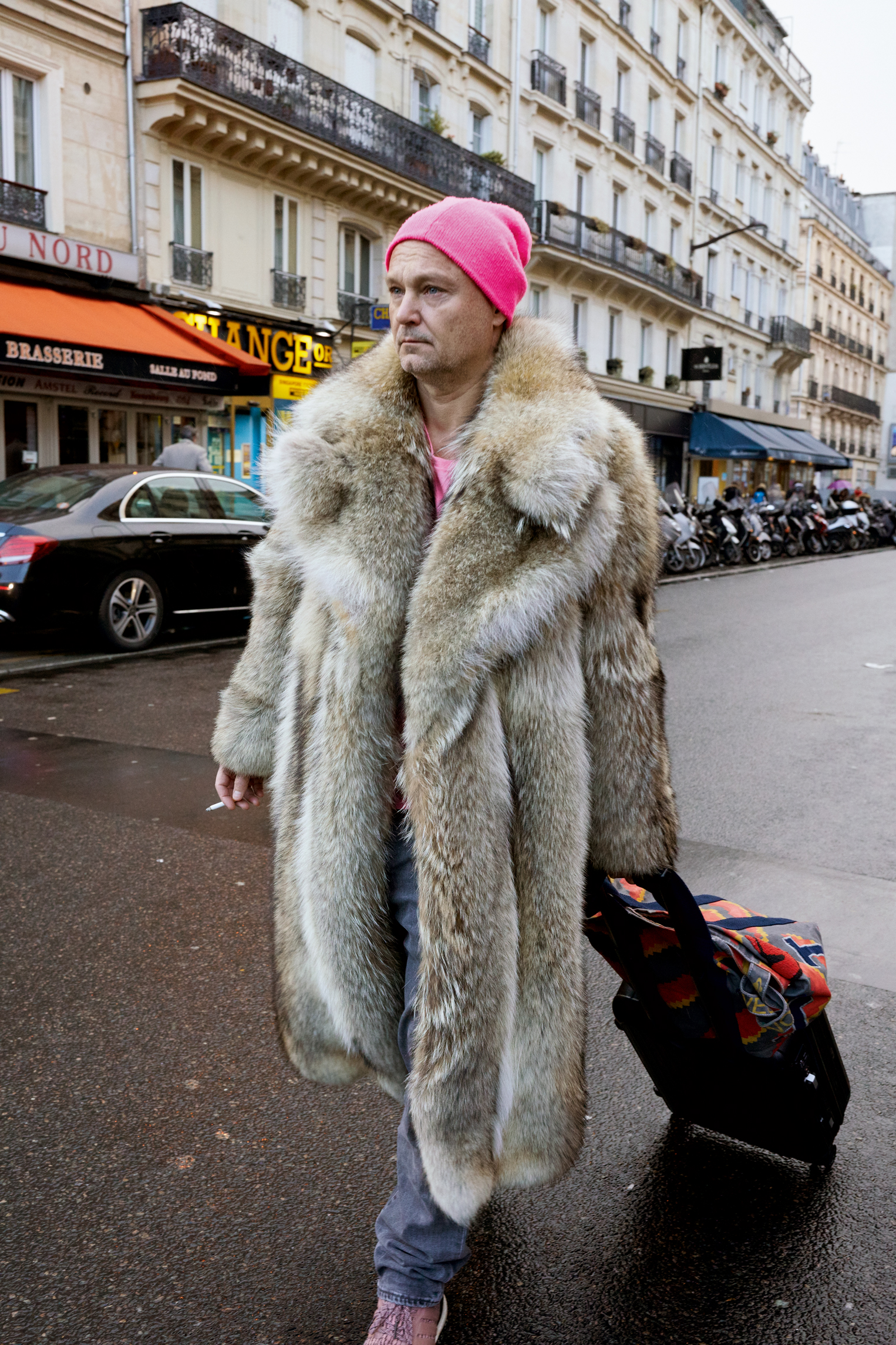Purple Magazine
— Purple 76 Index issue #29 S/S 2018
Teller juergen
self-portrait by JUERGEN TELLER
interview by OLIVIER ZAHM
 FUR COAT CÉLINE
FUR COAT CÉLINE
OLIVIER ZAHM — Do you separate your commercial fashion pictures from the non-commissioned ones? It seems that you don’t.
JUERGEN TELLER — I separate them very carefully. A commissioned advertising campaign or certain magazine editorials are literally different from, let’s say, my series Irene im Wald [Irene in the Forest], for which I went for walks with my mother through our backyard forest over a period of one year and wrote a text underneath. Nobody asks me to do that — or to do a five-month project with school children aged six and seven. There’s no deadline, no commercial value, no clients, no publicists, no vanity: it’s purely what I want to do! Commercial fashion photography has to have a purpose, a value. I have to carefully listen to the requirements of the client, which I do, and it has to make sense to both parties. I enjoy this very much; it is a collaboration where, yes, I am the director, but, for example, so is Phoebe Philo, and we harmoniously work toward a result. I do get a lot out of that: I learn about the clothes, have an adventure, see places, meet people, and make money. I always have to do it my way, otherwise I simply fail. Furthermore, I try to control as much as I can, in terms of layout and other things. The bottom line is simple: I want to produce good work, whether fashion-related or otherwise.
OLIVIER ZAHM — Would you say your work is mostly autobiographical, since you tend to be more and more inside the story you shoot?
JUERGEN TELLER — Yes, everything has to come from you, and only you, from your life, whether before or just lived, from good or bad experiences. What’s the point, in terms of fashion photography, for example, of looking at Helmut Newton, Guy Bourdin, Richard Avedon and simply copying their work?
OLIVIER ZAHM — Is it possible to shoot a nude picture without being criticized for “objectification”?
JUERGEN TELLER — I’m not sure I understand the question. Nor does it interest me. I simply follow my instincts, what I feel, and what I’d like to do. I take the same pleasure photographing a forest or having a huge snail from Africa on my legs with peaches around me, as I do when photographing a nude or my mother or, or, or. I’m interested in what touches my heart and soul, and I simply do it and, really, I don’t care what other people think. I feel quite pure and innocent in my way of working and thinking.
OLIVIER ZAHM — What do you like about nudity?
JUERGEN TELLER — The color of the skin, the flesh, the pureness, the shapes, the way we were born. Truthfully, it’s not that important to me. And yet it is, too. There were three times when it meant a lot to me. One was when I photographed myself nude. I think I learned something from that, and I always want to learn. The other two times were when I photographed Charlotte Rampling nude in front of the Mona Lisa and photographed Vivienne Westwood nude on her sofa. That truly interested me, as I hadn’t seen such things before and I wanted to go somewhere I hadn’t gone before.
OLIVIER ZAHM — You do so many books and exhibitions today. How do you select the pictures that are “art” and that can last beyond the moment?
JUERGEN TELLER — Every day, I ask myself this question. I am extremely concentrated when I work in my studio and try to make some sense of it. I take my work very seriously.
OLIVIER ZAHM — You’ve been pretty successful in your transition from film to digital photography. Do you ever feel nostalgic for shooting film?
JUERGEN TELLER — No, I love digital, it gives me everything I dreamed of: independence, freshness, editing, iPhone, computers, layout. Everything is in-house now, including a big printing machine. It gives me tremendous freedom — freedom I haven’t had before. Shooting on film feels totally idiotic to me now.
OLIVIER ZAHM — I personally consider you the best living photographer, and it’s hard to explain why. There’s energy, a frank and unapologetic aesthetic, a sense of humor, a love for women, fearless experimentation, and a powerful vision of freedom, sexuality, and individuality. What, from your point of view, makes your photography so unique beyond these things?
JUERGEN TELLER — I just do what I believe in, but thank you, Olivier, for your thoughts and compliments. I guess I have a sense of myself and what I like to do, and I’m following it through and work very hard on it. I guess my strength is that I can access things very fast and that a certain charm helps me. I think you have to be nice to people and respect them in order to get things in return. I think that’s very important.
OLIVIER ZAHM — Do you have a favorite woman model these days?
JUERGEN TELLER — No.
OLIVIER ZAHM — Your photography is strongly influenced by the context, whether a city or a cultural situation. Are you conscious of this?
JUERGEN TELLER — Yes, of course. I basically live what I’m shooting. Let’s say in Tokyo — a project I did with Araki, with Anna Ewers. This was a real-life moment, not just a job. I lived it.
END







![Assche [van] kris](https://i1.wp.com/static.purple.fr/2018/02/3857_13-copie-768x1023.jpg?width=460&height=686&resize=460,686)
![Assche [van] kris](https://i1.wp.com/static.purple.fr/2018/02/3857_13-copie-768x1023.jpg?width=496&height=686&resize=496,686)











































































































































![Assche [van] kris](https://i0.wp.com/static.purple.fr/2018/02/3857_13-copie-768x1023.jpg?width=514&height=360&resize=514,360)





































































